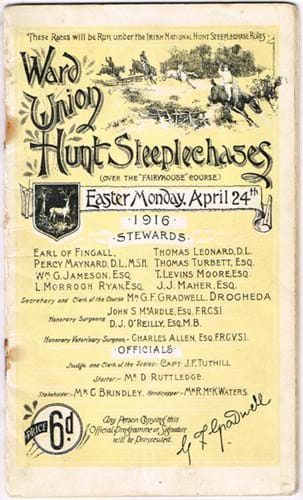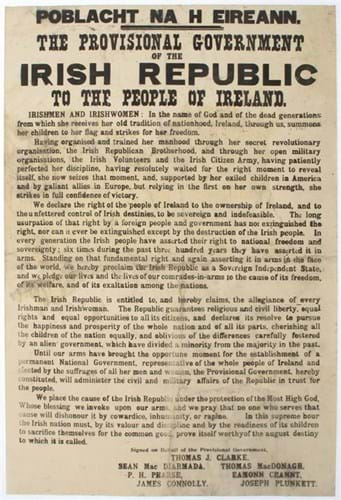Over 1000 copies of the Proclamation dated Monday 24 April 1916 were due to have been produced, but a shortage of paper and type meant that only around 500 copies were made in the first print run in Liberty Hall in 1916. Most of these examples were destroyed during the Easter Rising and, of the surviving copies, over half are now in museums. Auctioneer Ian Whyte thought that only 12 to 15 remain in private hands.
Return to the Market
This example was restored in 2001 and was offered at the auction framed and glazed. The 2ft 6in x 20in (76 x 51cm) document had been acquired by the US vendor at Whyte's in January 2001 where it sold for 52,000 Irish Punts.
Since then other copies have emerged on the market. In Ireland, a number of copies made over €200,000 during the ‘Celtic Tiger’ years, although prices dipped below €100,000 after the 2008 market crash.
Sotheby’s sold a copy for £140,000 in London in December 2004 – one of three signed by the printer Christopher Brady. They also sold another copy in December 2015 for a premium-inclusive £305,000, an example that emerged fresh to the market having been in the same collection since 1916.
ATG understands that the underbidder on the latter copy at Sotheby’s was also the underbidder here at Whyte’s.
Featuring a number of items related to the Rising, The History & Literature auction in Dublin raised a hammer total of €460,000 from 512 lots.

The race card for the Ward Union Hunt Steeplechases from Easter Monday, 1916 that sold for €4000 at Whyte’s.
Also bringing demand was a rare race card from the Ward Union Hunt Steeplechases in Fairyhouse, County Meath that took place on Easter Monday, 1916. The historical significance of the races lies in the fact that they were attended by a large number of the British garrison and administration, and their absence from Dublin at the beginning of the Rising facilitated the insurgents in establishing their strongholds around the city.
Estimated at €300-€500, the card sold at €4000 to a private buyer from the North of Ireland. A representative from the Ward Union Hunt in Co. Meath was the underbidder.
The buyer’s premium was 20%.





